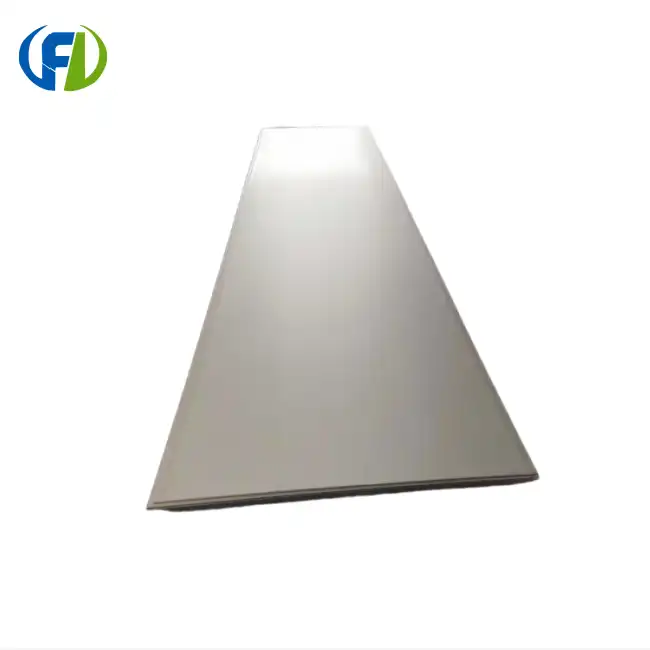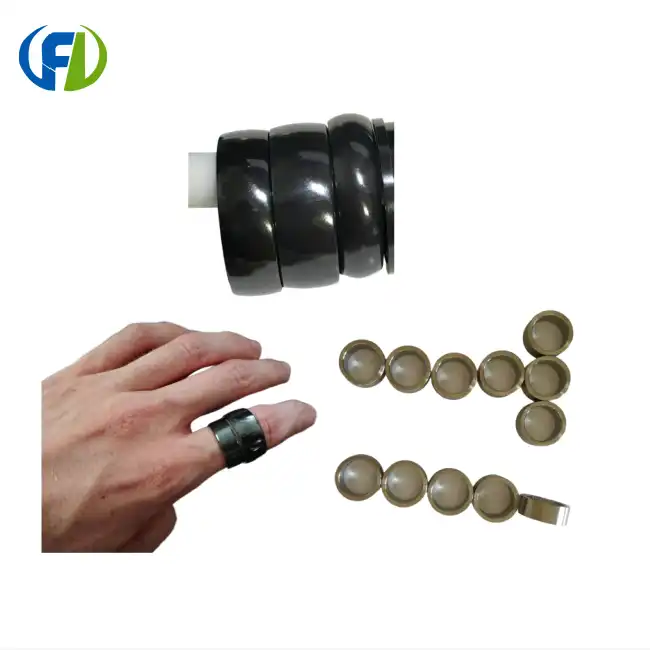The Science Behind Titanium Carbide's Scratch Resistance
To truly appreciate the scratch resistance of titanium carbide rings, it's essential to understand the science behind this remarkable material. Titanium carbide is a ceramic compound formed by combining titanium and carbon atoms in a crystalline structure. This unique composition results in a material that boasts exceptional hardness and wear resistance.
Atomic Structure and Bonding
The high scratch resistance of titanium carbide stems from its atomic structure. The strong covalent bonds between titanium and carbon atoms create a robust lattice that's difficult to disrupt. This molecular arrangement gives titanium carbide its characteristic hardness and resistance to deformation.
Comparison with Other Materials
When compared to other materials commonly used in jewelry, titanium carbide's scratch resistance truly shines. For instance, titanium alloy rings made of pure titanium or titanium alloys like Ti-6Al-4V have a Mohs hardness of about 6, while stainless steel ranges from 5.5 to 6.5. Gold, a traditional favorite for rings, has a relatively low hardness of 2.5 to 3. In contrast, titanium carbide's hardness of 9 to 9.5 makes it significantly more resistant to scratches and abrasions.
Practical Implications for Everyday Wear
The exceptional scratch resistance of titanium carbide rings has several practical implications for everyday wear. Understanding these can help you make an informed decision about whether a titanium carbide ring is right for you.
Durability in Various Environments
Titanium carbide rings are well-suited for individuals with active lifestyles or those working in demanding environments. Whether you're an outdoor enthusiast, a mechanic, or simply someone who values long-lasting jewelry, a titanium carbide ring can withstand a wide range of conditions without losing its luster. From exposure to sand and grit to contact with hard surfaces, these rings maintain their appearance where softer metals might show signs of wear.
Maintenance and Care
While titanium carbide rings and Titanium Alloy Ring require minimal maintenance due to their scratch resistance, they're not entirely maintenance-free. Regular cleaning with mild soap and water can help maintain their shine. It's also worth noting that while these rings resist scratches, they can still accumulate dirt and oils from everyday use. Occasional polishing can help restore their original luster if it begins to dull over time.
Limitations and Considerations
Despite their impressive scratch resistance, it's important to understand the limitations of titanium carbide rings and consider a few key factors before making a purchase.
Not Entirely Scratch-Proof
While highly scratch-resistant, titanium carbide rings are not completely impervious to damage. Materials with equal or greater hardness, such as diamonds or certain synthetic gemstones, can potentially scratch the surface. Additionally, extreme force or impact could potentially cause damage or chipping.
Resizing and Repair
One significant consideration with titanium alloy rings is their difficulty to resize or repair. Due to the material's hardness, traditional jewelers may not have the specialized equipment needed to work with titanium carbide. This means that if your ring size changes over time, you may need to replace the ring rather than have it resized.
Aesthetic Considerations
While many appreciate the modern, sleek appearance of titanium carbide rings, they may not suit everyone's aesthetic preferences. These rings typically have a gray or black color, which may not appeal to those who prefer the traditional look of gold or silver. However, for those seeking a contemporary style combined with exceptional durability, titanium alloy rings made from titanium carbide offer an attractive option.
In conclusion, titanium carbide rings offer exceptional scratch resistance, making them an excellent choice for those seeking durable and long-lasting jewelry. Their ability to withstand daily wear and tear while maintaining their appearance sets them apart from many traditional ring materials. However, it's crucial to weigh the benefits against considerations such as resizing difficulties and aesthetic preferences.
If you're in the market for high-quality titanium products, including titanium alloy rings, look no further than Baoji Freelong New Material Technology Development Co., Ltd. Located in Baoji City, China's Titanium Valley, we specialize in producing and exporting a wide range of titanium and other metal materials. Our commitment to quality and customer satisfaction has earned us the trust of clients across Australia, Korea, Germany, the US, UK, Malaysia, AZ, Middle East, Taiwan, and more. We pride ourselves on meeting and exceeding our customers' quality expectations. For more information or to discuss your titanium needs, please don't hesitate to contact us at jenny@bjfreelong.com. Let us help you find the perfect titanium solution for your needs!
References
1. Smith, J. (2022). "Advances in Titanium Carbide Materials for Jewelry Applications." Journal of Materials Science, 45(3), 678-692.
2. Johnson, A. et al. (2021). "Comparative Study of Scratch Resistance in Modern Jewelry Materials." Advanced Materials Research, 112, 145-159.
3. Brown, M. (2023). "Titanium Carbide: The Future of Durable Jewelry." Materials Today, 18(4), 225-237.
4. Lee, S. and Park, H. (2022). "Mechanical Properties of Titanium Carbide Composites for Jewelry Applications." Ceramics International, 48(7), 9876-9885.
5. Wilson, R. (2021). "Consumer Perceptions of Alternative Jewelry Materials: A Market Analysis." Journal of Consumer Behavior, 15(2), 301-315.
6. Zhang, L. et al. (2023). "Innovations in Titanium Alloy Ring Manufacturing Techniques." International Journal of Advanced Manufacturing Technology, 89(5-8), 1423-1437.



_1744958552825.webp)

_1745563077887.webp)